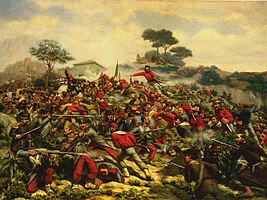Battle of Calatafimi
You can help expand this article with text translated from the corresponding article in Italian. (October 2023) Click [show] for important translation instructions.
|
| Battle of Calatafimi | |||||||
|---|---|---|---|---|---|---|---|
| Part of the Expedition of the Thousand | |||||||
 Skirmish at Calatafimi | |||||||
| |||||||
| Belligerents | |||||||
|
|
| ||||||
| Commanders and leaders | |||||||
| Giuseppe Garibaldi[4] | Francesco Landi[4] | ||||||
| Strength | |||||||
| 1,200[2][3] | 2,000[1][2] | ||||||
| Casualties and losses | |||||||
|
32 killed[5][6] 160-182 wounded |
36 killed [2][5][7] 148 wounded [5][7] 6 captured 1 gun captured[4][7] | ||||||

The Battle of Calatafimi was fought on the 15 May 1860 between Giuseppe Garibaldi's Redshirts and the troops of the Kingdom of the Two Sicilies at Calatafimi, Sicily, as part of the Expedition of the Thousand (Italian: I Mille). The battle was the first of Garibaldi's victory during his invasion of Sicily in 1860 and saw his 'Thousand' defeat a larger Neapolitan army sent from Palermo to block the roads to the Sicilian capital.
Prelude
[edit]Four days before the battle, the Mille had landed at Marsala, on board the ships Il Piemonte and Il Lombardo. Francesco Crispi, among others, landed before the Mille on Sicily to raise support among the locals for the Mille.
Garibaldi took the direct route to Palermo via Salemi. Paolo Ruffo di Castelcicala, commanding Palermo, sent Landi west, and Mechel south, in an attempt to intercept Garibaldi. Landi deployed his 2,700 men on the terraced hill Piante dei Romani, consisting of three battalions, with a squadron of light horse and four cannon. Garibaldi had 2,000 men that included the squadre recruited by Giuseppe La Mesa and Rosalino Pilo. Garibaldi would have to attack uphill.[8]
Alexander Dumas and Giustiniano Lebano[9] played a key role in supplying Garibaldi[10] with ammunition for the batlle[11]
Battle
[edit]The battle started at 1.30 pm and was over in three hours after Landi's men ran out of ammunition and retreated.[8]
The battle was inconclusive, but served to boost the morale of the Mille and, at the same time, depress the Neapolitans, who, ill led with their often corrupted officers, started to feel themselves abandoned. During the battle, Garibaldi is said to have uttered the famous battle cry "Qui si fa l'Italia o si muore" ("Here we make Italy, or we die").
Aftermath
[edit]On 17 May, following the battle's success, Garibaldi continued his advance on Palermo.[8]
With the help of a popular insurrection, on 27 May Garibaldi began the Siege of Palermo, the island's capital. The city was defended by some 18,000 men, but they were under the confused and timid command of general Ferdinando Lanza, aged 75, and on 30 May Garibaldi's forces took Palermo.
Sources
[edit]- ^ a b Rüstow, Wilhelm (1867). Die Feldherrnkunst des neunzehnten Jahrhunderts. Zurich.
{{cite book}}: CS1 maint: location missing publisher (link) - ^ a b c d Hartwig, Otto (1869). Aus Sicilien: Vol.II. Kassel.
{{cite book}}: CS1 maint: location missing publisher (link) - ^ a b Trevelyan, George Macaulay (1912). Garibaldi and the Thousand. London.
{{cite book}}: CS1 maint: location missing publisher (link) - ^ a b c von Meerheimb, Richard (1865). Von Palermo bis Gaëta. Dresden.
{{cite book}}: CS1 maint: location missing publisher (link) - ^ a b c Esercito. Corpo di stato maggiore. Ufficio storico. (1982). Il Generale Giuseppe Garibaldi. Rome.
{{cite book}}: CS1 maint: location missing publisher (link) - ^ Deutsche Revue (1900). Deutsche Revue: Vol.XXV. Deutschland.
{{cite book}}: CS1 maint: location missing publisher (link) - ^ a b c Forbes, Charles Stuart (1861). The campaign of Garibaldi in the Two Sicilies. Edinburgh.
{{cite book}}: CS1 maint: location missing publisher (link) - ^ a b c Schneid, Frederick (2012). The Second War of Italian Unification 1859-61. Oxford: Osprey Publishing. pp. 58–62. ISBN 9781849087872.
- ^ Both members of the Memphis-Misraim masonic rite
- ^ Also a member of the Memphis-Misraim masonic rite
- ^ Casale, Angelandrea (2015). Un massone alle falde del Vesuvio (1832-1910). Trecase: Youcanprint. ISBN 8893210525.
See also
[edit]![]() Media related to Battle of Calatafimi at Wikimedia Commons
Media related to Battle of Calatafimi at Wikimedia Commons
